Writing a formal letter is not just about sending a handwritten letter or writing an email to a professional contact. A properly formatted formal letter conveys a lot more than the message. A formal letter represents you, the message, the importance & seriousness, calls for a time-bound action and can be presented as a legally bound document.
This article provides a detailed guide on how to write a formal letter, the importance of using formal language, and the formal letter format.
Of course, you wouldn’t want to sound amateur.
What is a formal letter?
A formal letter is a communication written in a formal and ceremonious language and follows a specific format. Formal letters are written for business, applying for jobs, making a complaint, officials, questioning a decision, authorities, colleagues, seniors, etc. Formal letters are not meant for personal contacts, friends, or family. In crafting a formal letter, whether for business inquiries or legal matters, understanding the intricacies of your venture’s structure is paramount. For entrepreneurs in the Sunshine State, learning how to open an LLC in Florida can significantly influence the professionalism and legality of your correspondence, ensuring your business communication is on solid ground.
Writing a formal letter is all about creating the right impression. There various do’s and don’ts to keep in mind while writing a formal letter.
Formal letters can tell a lot about your personality. They inform the reader about your concern, get you a job, or provide updates/information on a certain topic.
There are two types of formal letters
- Block style
- Administrative Management Style
Block style is the most frequently used formal letter format for business communications. It has salutations and closing and can be used for all sorts of business and formal communications.
Other the other hand AMS style is used for writing memos, orders, and notices, where you need to be direct and to the point.
- A formal letter has various set rules and steps about layout, language, and tone that you should follow.
- There are set places to put everything like salutation, address, date, body, and closing.
- The way you begin and end your formal letter is very important.
How to write a formal letter? Steps and tips.
Formal letter format
Contact Information (Include your contact details unless you are using a letterhead that already inclueds your contact information.)
Your Name
Your Address
Your City, State Zip Code
Your Phone Number
Your Email Address
Date
Contact Information (Recipients details)
Name
Title
Company
Address
City, State Zip Code
- Senders details: An ideal formal letter layout begins with
- Start with your address in the top-right corner of the page.
- Immediately, below the address include the date.
- Below this, on the left-hand side of the page, write the name and address of the person that you are writing to.
You wouldn’t want to receive a letter addressed to a random person. would you? You must address the letter to the right person. In case you do not know the name of the person, mention the official title of the recipient. And if you do not know of the title as well. Find it.
- Salutation: beginning a letter without a proper salutation is considered rude. The most commonly used salutation is “Dear”. choose wisely, salutations are based on whether or not you know the person.
Followed by person’s first or last name, “Dear” is the most commonly used salutation. If you do not know the recipient of the letter, you may begin with “Dear Sir/Madam” followed by a comma.
You may use “Ms.” if you are not aware of the marital status of a woman. Use Dr. followed by the name, if the recipient is a doctor.
For example:
- Dear Mr. Gupta,
- Dear Mr. Pravin,
- Dear Dr. Sharma,
Don’t forget to add the comma.
- Body and tone
A formal letter needs to be precise and to the point. At the same time, you must ensure the tone or the way your letter sounds, is polite yet firm. Sometimes you may find it hard to find the right balance. In such cases, I use this online paraphrasing tool to stay relevant with the tone and the context. It is extremely crucial to maintain consistency when you are writing a formal letter.
Skip a line after the salutation and start writing the body of the formal letter. The beginning of the formal letter is very important. Your opening line should focus on why you are writing the letter – get to the point straight away:
‘I would like to bring to your notice…’
‘I am writing to enquire about the job opening …’
Keep in mind that your formal letter should be short, clear, and must state your business. Think about the purpose of the letter and include all the relevant information to help the recipient to respond.
For example, If you are writing a job application, include every detail about the job advertisement. And if you are writing to complain about a specific problem, make sure to include, what, how, where, and other details.
4. Closing and Signature
At the end of the formal letter, make sure you provide a clear “Call of Action”. Always end your letter on a positive note and request a reply.
At the end of the formal letter, leave several lines, and write your signature.
Yours sincerely,
Aditya Sharma
Now that you have finished writing your formal letter, read it through to ensure you have mentioned your points thoroughly and accurately. Then, it’s ready to be sent off to its recipient!
Formal Resignation Letter sample
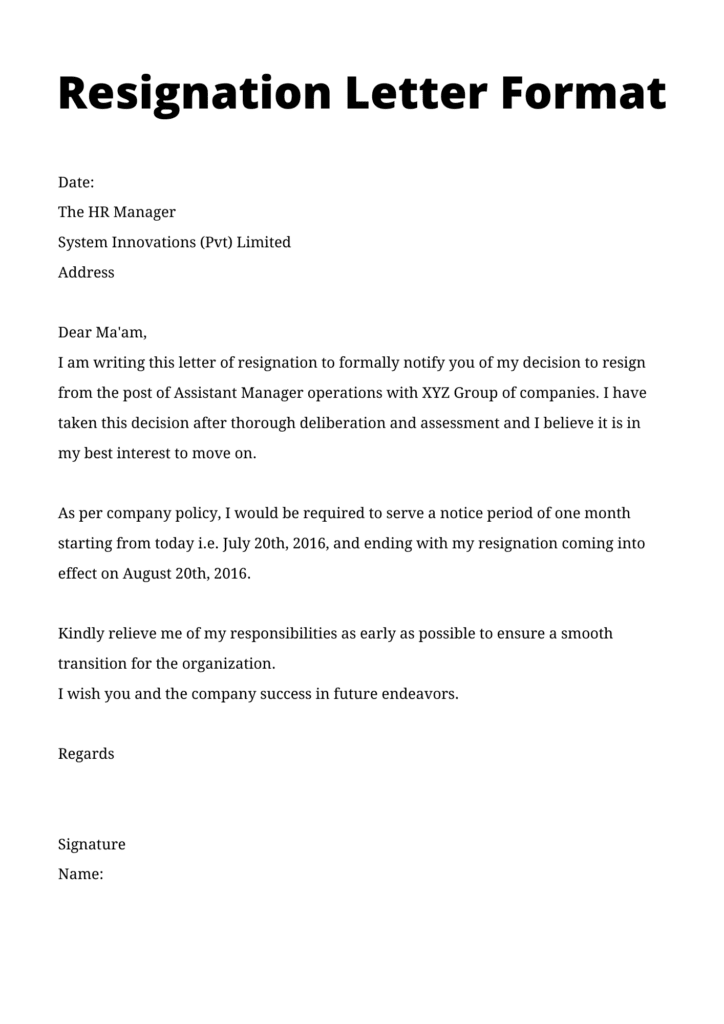
Date:
The HR Manager
System Innovations (Pvt) Limited
Address
Dear Ma’am,
I am writing this letter of resignation to formally notify you of my decision to resign from the post of Assistant Manager operations with XYZ Group of companies. I have taken this decision after thorough deliberation and assessment and I believe it is in my best interest to move on.
As per company policy, I would be required to serve a notice period of one month starting from today i.e. July 20th, 2016, and ending with my resignation coming into effect on August 20th, 2016.
Kindly relieve me of my responsibilities as early as possible to ensure a smooth transition for the organization.
I wish you and the company success in future endeavors.
Regards
Signature
Name:
Formal letter format: How to write a formal letter
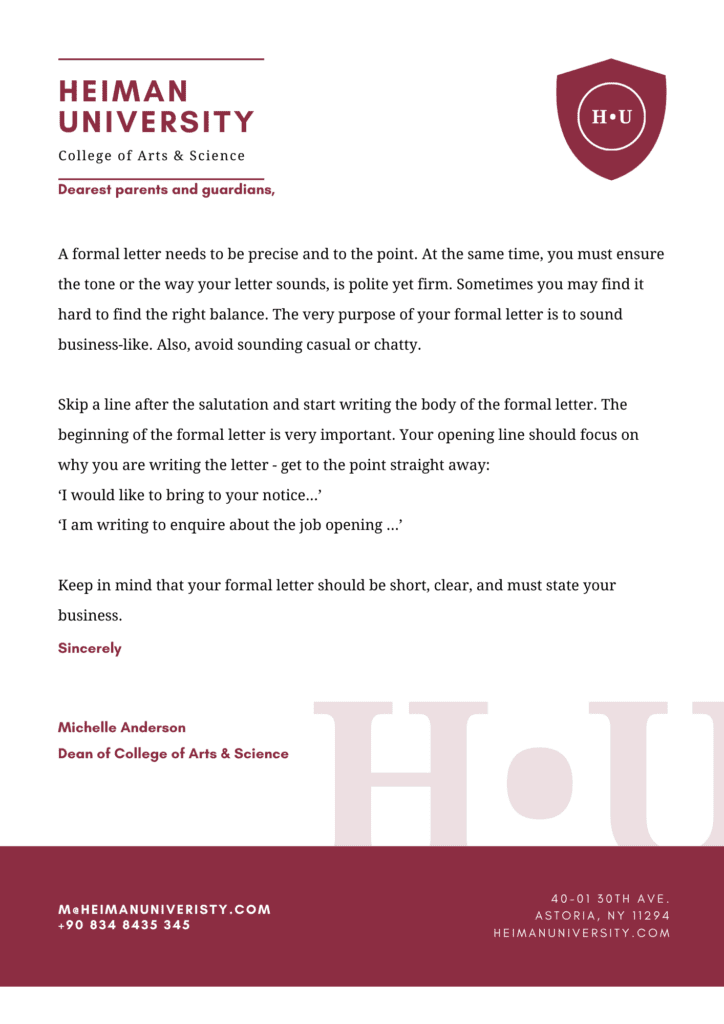
A formal letter can be anything starting from an application for a job, resignation letter, thank you letter after interview, cover letter for job application, a warning letter for poor performance, employee warning letter a job offer letter, a relieving letter format, a request letter format for a character certificate, complaint letter, a business communication letter, leave application letter format, etc. you’d find an appropriate formal letter format for every requirement.

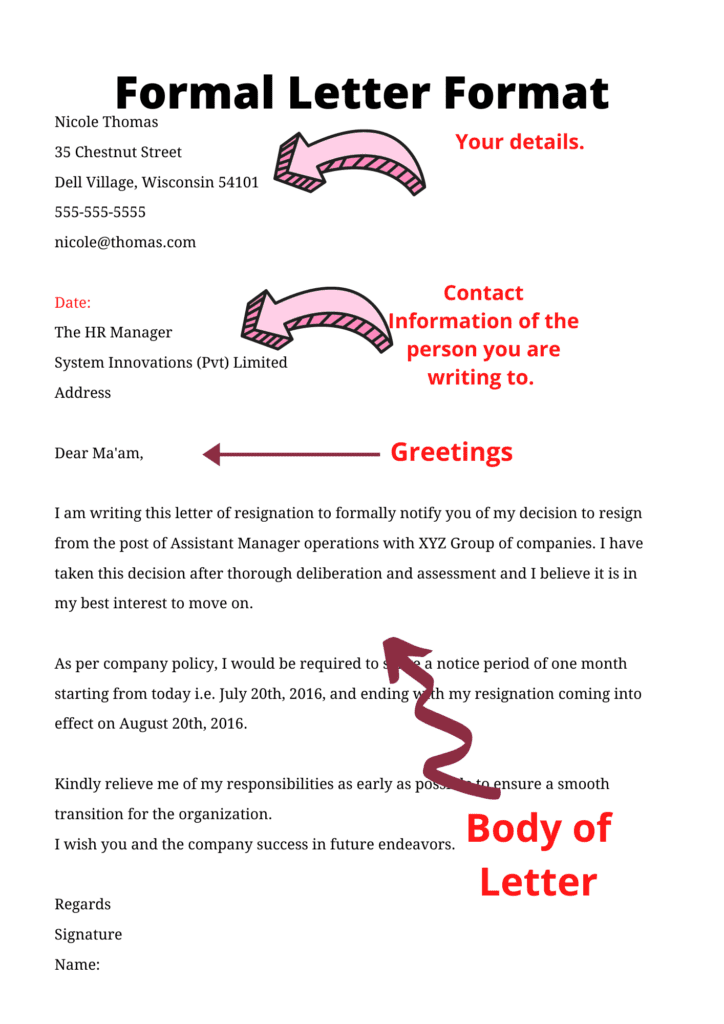
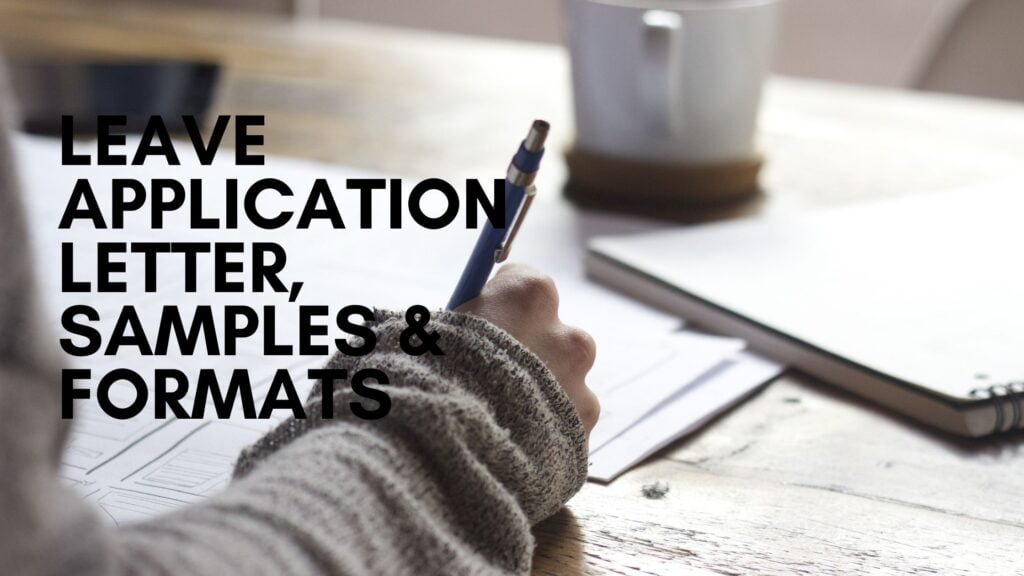
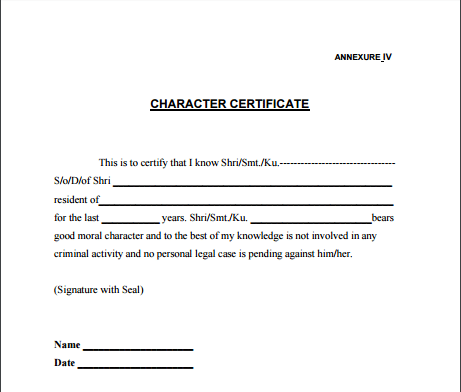
Pingback: Formal Business Letter Format: Step-by-Step Guide - Weddings234 - Weddings234